Bradford fire: The Valley Parade disaster 30 years on
- Published
Bradford City fire disaster remembered
"People didn't die because of fires at football grounds. It was unprecedented."
Those are the words of David Pendleton, a survivor of the Bradford City fire disaster, which happened 30 years ago.
Fifty-six people died. More than 250 others were injured in one of the biggest disasters at a British football ground.
Bradford City were supposed to be celebrating on 11 May 1985. The team was presented with the Division Three championship trophy - their first trophy in 56 years - in front of 11,000 jubilant fans before the start of their match against Lincoln City.
Instead it turned into a day of appalling tragedy. The main stand at Valley Parade burned down after what was thought to be a dropped cigarette led to flames which engulfed the entire wooden structure.
Surviving supporters, former Bradford players, the sole television commentator at the stadium and the judge who led the government inquiry tell the BBC about that fateful afternoon and its aftermath.
Warning: Some readers may find parts of this content distressing.
Celebration - 'The day was for the fans'
The 1984-85 season had been one of the most successful in Bradford City's 82-year history. Led by former England international Trevor Cherry, the Bantams won only their third divisional title and earned a return to the second tier of English football for the first time since 1937.
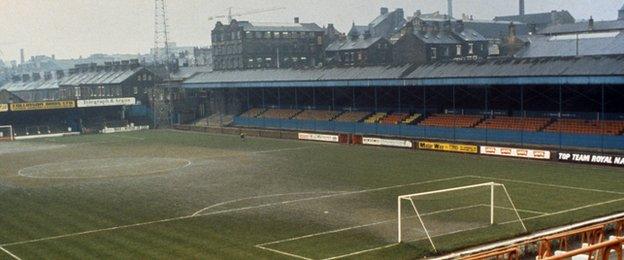
The main stand at Valley Parade was built in 1911 and had not been upgraded before the fire in 1985
Former Bradford midfielder John Hendrie, who was playing in the match: "We had already won the league, all the hard work had been done. We went there to win the last game in front of a home crowd.
"We went out on to the pitch and I could see so many happy faces. We were given the trophy before the game in front of the supporters and had to do a lap of honour.
"Then we ran out in our tracksuits each holding a massive card with a letter. It spelt out 'thank you fans'. This day was for them."
ITV football commentator John Helm, who provided live commentary of the unfolding disaster across the nation: "We wouldn't normally have covered that game - no question about it. We wanted to record the trophy presentation. The game was irrelevant."
Danger - 'Something caught my eye'
Bradford, playing into a strong wind, were struggling to break down a Lincoln side already safe from relegation. The game was goalless after 40 minutes when play was stopped.
Helm: "There was a throw-in in front of the stand where the fire started - something caught my eye. I asked the director to get the camera to go a little closer. There was a bit of paper on fire, but it was so small."
Hendrie: "Several minutes before half-time I saw there was a wee bit of bother. In those days there was a lot of hooliganism and violence, so my initial thought was: 'I hope it has not kicked off - that's the last thing we need'.
"The referee blew his whistle to stop the game and told us to get back to the dressing room."
Bradford fan David Pendleton, then aged 21 and stood in the main stand: "For the first minute people were laughing and joking, it wasn't anything serious. And then suddenly, in the space of 120-odd seconds, it really kicked in.
"How quickly the fire spread is difficult to convey to people."
Panic - 'I looked up and saw the flames'
Television cameras spotted the outbreak of fire in Valley Parade's main stand at 15:40 BST. Within five minutes the whole stand was engulfed in flames.
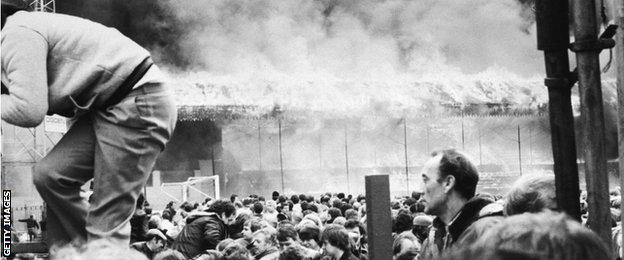
Helm: "The scene became progressively horrendous, grotesque, and I was having to describe things you couldn't possibly imagine."
Pendleton: "I got pushed down to the front and I remember looking around and suddenly this smouldering, small fire had taken over virtually half a block and was starting to hit the roof.
"That's when I thought 'this is time to get out of here'. That's when everybody else had the same thought.
"I got stuck against the wall with the weight of people behind me trying to get over. Somebody looked round and grabbed me by the hood of my coat to pull me over. I rolled over on my head, jumped up and ran off."
Bradford fan Matthew Wildman, who was aged 17 and using crutches because of rheumatoid arthritis: "When I got to one of the final walls, there was an eight-foot drop at the other side, concrete at the bottom. Your brain tells you, you are not going anywhere.
"I looked up and saw the flames. I looked down and I saw my hands melting. So I threw myself over the wall and luckily someone dived in to catch me before I hit the floor."
Chaos - 'All you could smell was burning'
About 3,000 people were in Valley Parade's main stand, escaping by climbing over walls on to the pitch or through the usual exit gates. The government inquiry into the disaster concluded the fire spread "faster than a man could run".
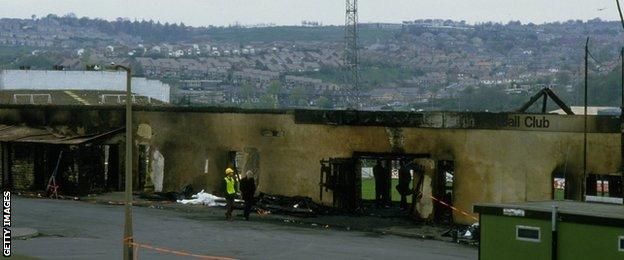
Hendrie: "Us players must have been in the tunnel for seconds - and I mean seconds. Someone came in and shouted: 'Get out, get out there's a fire'.
"We couldn't run back down the tunnel. We had to run up the stairs, through the office doors and out on to the street. Once we went out it was mayhem, manic, chaotic.
"All you could see was black cloud. All you could hear was sirens and screams. And all you could smell was burning."
Wildman: "I was dragged on to the pitch and into a line of people, who couldn't do much for themselves and were lying there. I remember trying to make sense of what was going on. Funnily enough I was thinking 'I'm going to miss the second half at this rate'.
Pendleton: "As I ran away I remember turning around and looking and just seeing this wall of grey smoke pouring out and pushing thousands of people in front of it.
"That was the moment that I realised not everybody was going to get out."
Dread - 'Mum didn't know if I was dead'
'It was supposed to be a day of celebrations'
Hendrie: "The players were told to go to the pub at the top of the road, we didn't know at this point if anyone had been killed. The scene in there was one of silence and shock. We had not been told anything."
Pendleton: "I walked past a public telephone outside the ground and there were queues of people waiting to ring home to say: 'I'm OK'.
"Some of the local residents opened their houses so people could make phone calls. There were queues of people outside houses, which obviously wouldn't happen nowadays.
"Until I arrived home my mum and my brother had no idea whether I was alive or dead."
Hendrie: "We stayed in the pub for hours. We were sat in our football kit, we didn't know what to do. It wasn't until later on when assistant manager Terry Yorath came in and said: 'It's not good.'"
Aftermath - 'The injured formed a family'
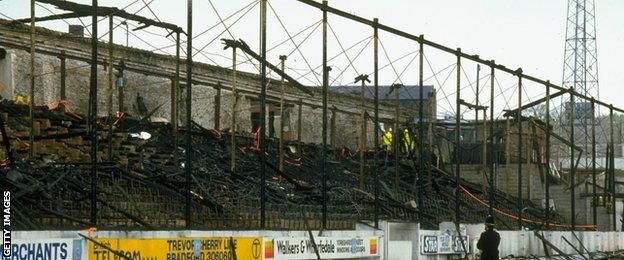
Wildman: "I was burnt from top to bottom, on and off. Bits of my arms, bits of my legs, part of my face, part of my scalp. My hands suffered the most because they were exposed the most.
"I was operated on every other day because I had so many burns and so many areas to work on. Some days I had two operations in a day. I was there in hospital for eight weeks - it felt like a lifetime. But all the people being treated, we formed a family, a bond."
Pendleton: "One of my most haunting images was being on the bus home after dark and going past Valley Parade.
"All I could see was eerie white lights that the fire brigade had set up and the smoke still in the sky. And the black and twisted skeleton of the burnt stand stood out in the night.
"I saw people die in the stand - but it was only until then that I realised the scale of it."
Sir Oliver Popplewell, the High Court judge who led the Valley Parade inquiry in 1985: "The scene when I arrived was horrendous. I had no idea. I'd seen the film on the Saturday but the bleakness of the stadium burnt out, and the gloom that afflicted everybody, was dreadful.
"A lot of investigative work had been done by the police when I got there. It was fairly clear that somebody had dropped a lighted match or cigarette between the floorboards."
Future - 'A disaster is not black and white'
A new book, written by Valley Parade survivor Martin Fletcher, claims then-Bradford City chairman Stafford Heginbotham had previously netted millions of pounds from insurance payouts after at least eight previous fires at businesses he was associated with.
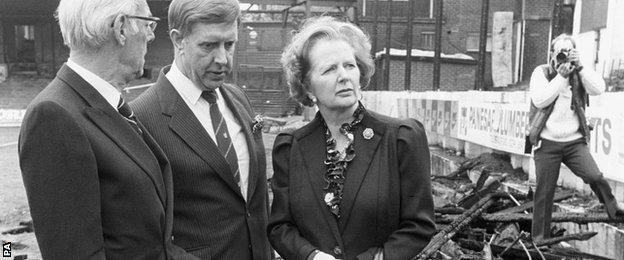
Prime Minister Margaret Thatcher, pictured with Bradford City chairman Stafford Heginbotham (centre) and her husband Denis, visited Valley Parade shortly after the fire
Martin Fletcher, whose brother, father, grandfather and uncle all died in the fire: "I'm taking the opportunity to lay out the facts that were not laid out in 1985 at the time of the inquiry or the inquests.
"I feel such information should be made public and people should look at those facts, then make their mind up on those facts.
"I want the truth to be out, the myths to be broken, so that I can get on with my life rather than knowing this information and having to live with this information."
Popplewell: "I'm sorry to spoil what is obviously a very good story, but I'm afraid it is nonsense for many reasons."
Pendleton: "Many people still don't want to talk about the disaster. The Bradford way was keep it to ourselves - it worked collectively that we did that.
"It wasn't covering anything up, it wasn't avoiding the truth of what happened, everyone knows what happened, everyone knows it shouldn't have happened.
"The letters that went to the club, the council's failings, the police's failings, even as supporters we allowed a culture where the gates were locked.
"A disaster is not black and white - it is a mass of factors."
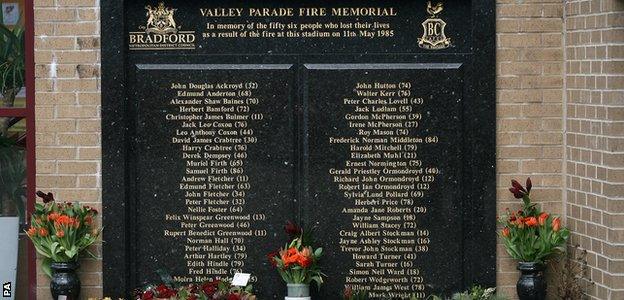
A memorial to the 56 victims is outside Valley Parade's rebuilt main stand
Interviews conducted by BBC Radio Leeds' Tim Daley. Martin Fletcher was talking to BBC Look North. Edited by BBC Sport's Jonathan Jurejko.
Listen to Valley Parade: Bradford City Fire Remembered on BBC Radio Leeds (18:00 BST) and BBC Radio 5 live (21:00 BST).
Watch Missed Warnings on BBC One in Yorkshire and Lincolnshire at 22:45 BST on Tuesday, 12 May. It is repeated across the country on BBC Two at 23:20 BST on Wednesday, 13 May.
- Attribution
- Published16 April 2015
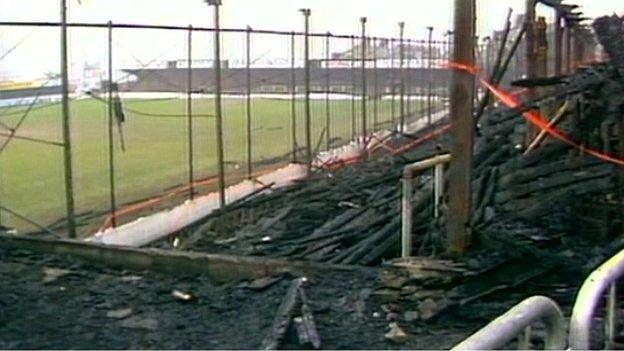
- Attribution
- Published15 April 2015
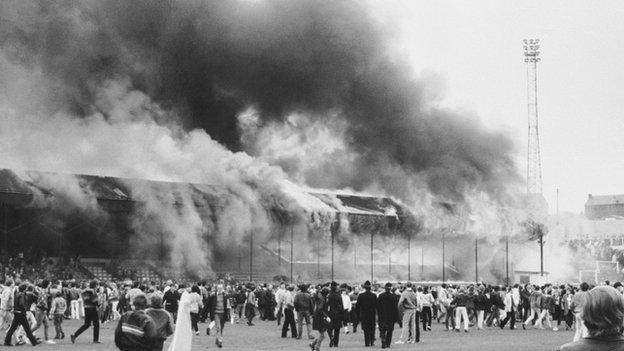
- Published20 June 2016
